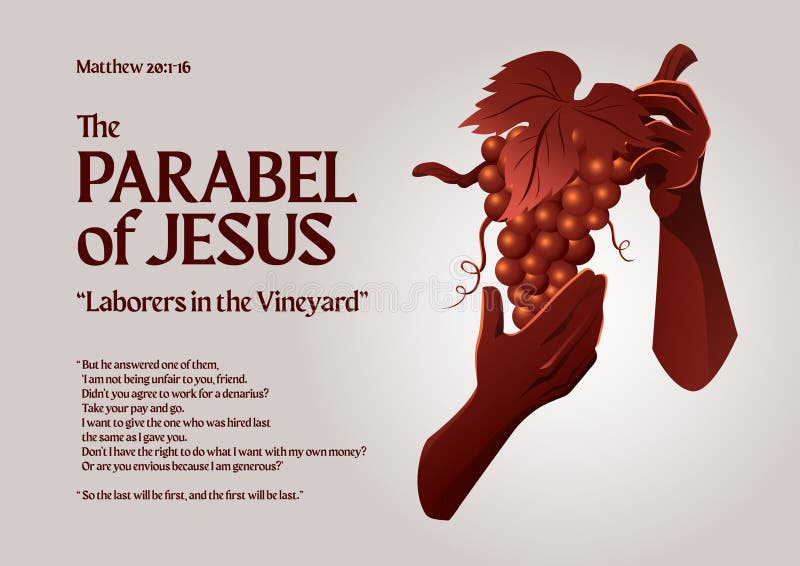The Parable of the Laborers in the Vineyard, as depicted in the Gospel of Matthew (20:1-16), presents a captivating narrative that goes beyond a mere story; it encapsulates profound theological insights into the nature of justice, grace, and the Kingdom of Heaven. In this parable, Jesus conveys essential truths about the divine economy, where God’s generosity often defies human notions of fairness and reward. The parable is relevant not only in the context of its original audience but also poses poignant questions for contemporary believers.
Imagine a vineyard owner who goes out at dawn to hire laborers for his vineyard. He agrees to pay them a denarius for a day’s work, which was a standard wage at the time. Throughout the day, the owner returns to the marketplace at various hours, hiring additional workers and promising to pay them “whatever is right.” Eventually, the day draws to a close, and all workers are summoned to receive their wages. Astonishingly, those who commenced work last received the full wage of one denarius before those who labored all day, leading to indignation among the hour-long workers. They grumble, lamenting, “These men who were hired last worked only one hour, and you have made them equal to us who have borne the burden of the work and the heat of the day.”
This narrative leads us to ponder a challenging question: Why does the landowner, a figure often interpreted as a representation of God, choose to reward the latecomers equally with those who toiled for hours? At first glance, the actions of the landowner appear unjust. In a worldly sense, laborers are often compensated according to the effort and time expended. However, the parable illuminates a deeper understanding of divine justice—not in terms of equity but in grace.
In this divine economy, the landowner’s response to the complaining workers—“Am I not allowed to do what I choose with what belongs to me? Or do you begrudge my generosity?”—reveals the essence of God’s grace. The juxtaposition of the workers’ expectations against the landowner’s benevolence reflects how the Kingdom of God operates beyond human logic. Jesus challenges the notion that merit and entitlement govern divine favor. Instead, it emphasizes that grace cannot be earned; it is a gift freely given, regardless of when one arrives in the faith.
Understanding this parable requires a recognition of the cultural backdrop of Jesus’ audience. During His ministry, Jesus often critiqued prevailing attitudes toward social status and righteousness. The workers in the parable symbolize the Jewish people, expecting superiority in God’s favor due to their historic labor and covenant. In contrast, the latecomers symbolize the Gentiles, those who appear to have little claim to the blessings of the Kingdom. By offering the same reward to all, regardless of their ‘work’ in the vineyard, Jesus redefines community and accessibility to God’s grace.
This paradigm shift does not merely encourage complacency; rather, it implores believers to introspectively examine their understanding of faith and reward. Are we, like the early laborers, tempted to feel entitled to God’s grace simply because of our toil in the vineyard of faith? Do we harbor resentment toward those who appear to receive blessing without equivalent sacrifice? The parable exhorts us to navigate the complexities of grace, urging a spirit of humility and acknowledgment that all blessings originate from God’s generosity.
Moreover, the parable speaks poignantly to the inclusivity of the Gospel. It underscores that the invitation to enter the vineyard is extended to everyone, regardless of their background or previous experiences. Each laborer represents various journeys of faith, and the promise of grace extends generously beyond traditional boundaries. It is a call to recognize and embrace the breadth and depth of divine mercy, prompting believers to extend similar grace to others.
The inherent tension between justice and grace is a prevalent theme throughout Scripture. The Parable of the Laborers in the Vineyard compels Christians to wrestle with the notion of fairness, leading to broader reflections on God’s character. As the parable illustrates, God’s ways are not our ways. He looks upon the heart rather than the clock. Where humanity seeks transactional exchanges—this for that—God offers lavish grace, often confounding our expectations. This invites a more profound trust in God’s divine wisdom and timing.
Ultimately, the Parable of the Laborers in the Vineyard provides fertile ground for contemplation regarding our posture before God and one another. It challenges us to relinquish our preconceived notions of deservingness and entitlement and to embrace a radical understanding of grace. The heart of this parable is not merely about equitable pay for labor but emphasizes the surpassing generosity of God, who invites all into His realm, transcending time and tradition.
As you reflect on this parable, consider your response to God’s grace in your life. Do you rejoice in the blessings others receive, or does envy cloud your perception? Embrace the challenge of viewing God’s generosity through a lens of gratitude, celebrating His provisions for all workers in His vineyard. In doing so, you embody the spirit of the Kingdom, welcoming all who are drawn to it with arms wide open, just as the landowner did for his laborers.



